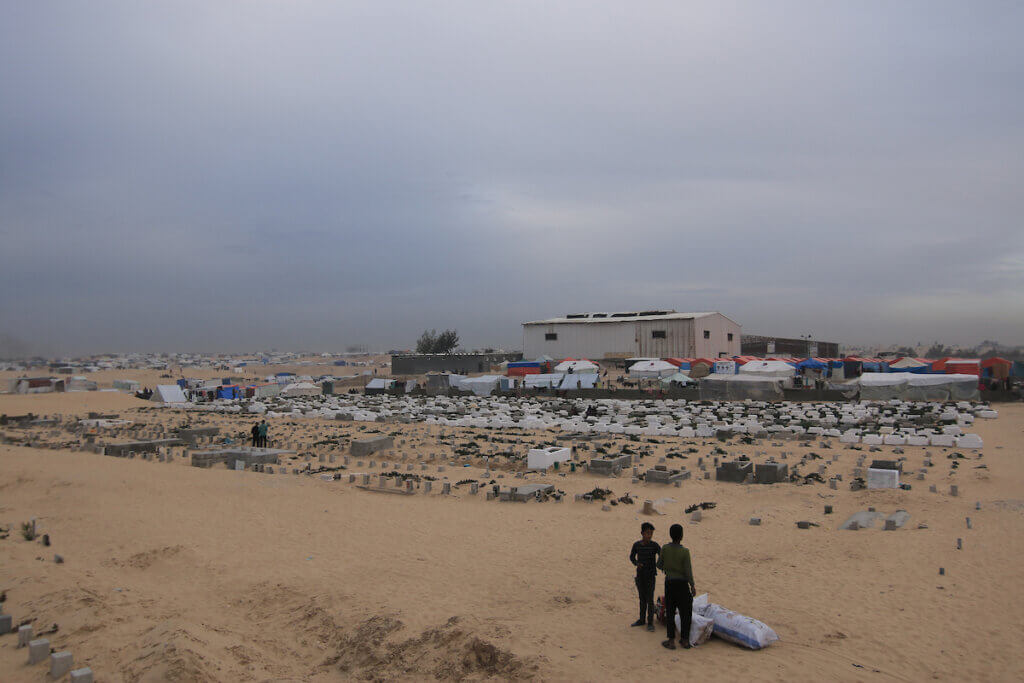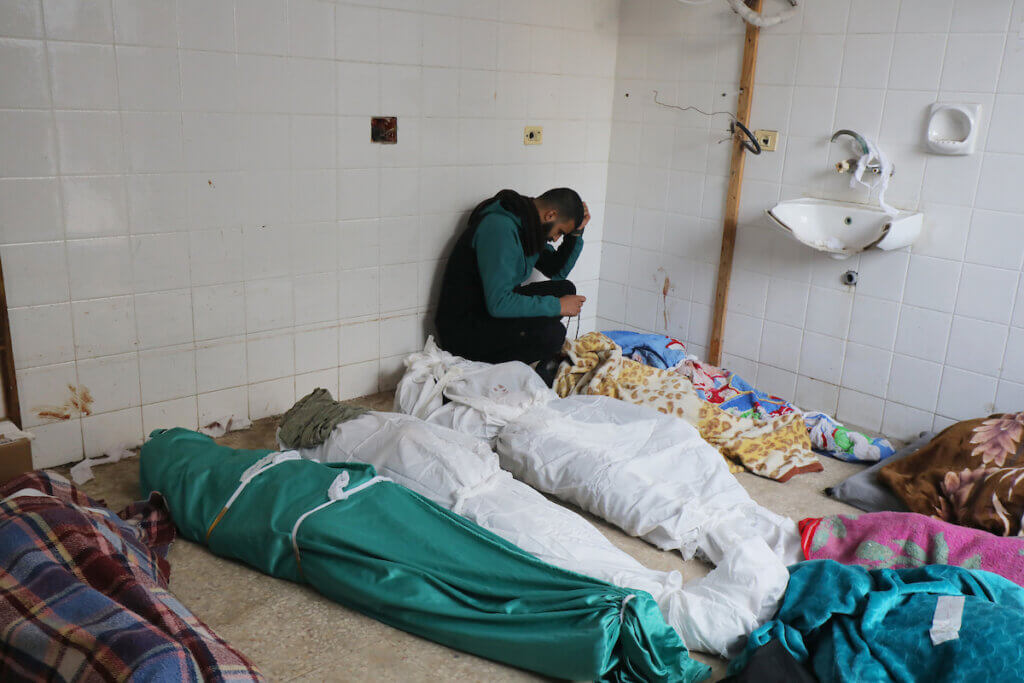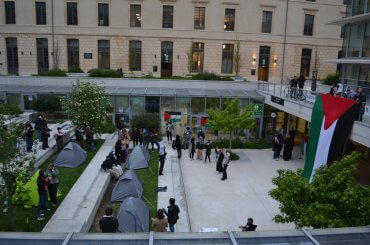Casualties:
- 28,576+ Palestinians have been killed in Gaza, including at least 12,000 children, and 68,291+ Palestinians have been injured.
- 380+ Palestinians killed in the occupied West Bank and East Jerusalem
- Israel revises its estimated October 7 death toll down from 1,400 to 1,147.
- 569 Israeli soldiers killed since October 7, and at least 3,221 injured.**
*This figure was confirmed by Gaza’s Ministry of Health on Telegram channel. Some rights groups put the death toll number at more than 36,000 when accounting for those presumed dead.
** This figure is released by the Israeli military, showing the soldiers whose names “were allowed to be published.”
Key Developments:
- Israeli fighter jets have begun an aerial assault in Lebanese territory
- Dozens of trapped Palestinians flee the Nasser Hospital in Khan Younis during deadly sniper attacks
- Israeli ships continue to attack Palestinian fishermen on Deir el-Balah’s beach
- Palestinian President Mahmoud Abbas urges Hamas to agree upon a ceasefire deal “quickly.”
- The number of Palestinian prisoners that Hamas wants released is now the “main gap” in truce negotiations
- Rafah’s population has increased five times since the Israeli military assault on Gaza began in October.
- Families of Israeli captives are on their way to the International Criminal Court (ICC) to lodge a case against Hamas.
- Committee to Protect Journalists releases a list of preliminary investigations that shows that at least 85 journalists and media workers have been killed since Israel launched its war on Gaza.
Displaced Palestinians evacuate Nasser Hospital in Khan Younis as sniper attacks escalate, ground invasion approaches
As ceasefire negotiations enter their second day in Cairo, fighting around Nasser Hospital in Khan Younis is intensifying—with dozens of Palestinians who have been sheltering inside forced to evacuate. Medicins Sans Frontiers (MSF) has said that there are about 400 patients in the hospital in critical condition.
“The situation is really critical for patients and we are worried about the future,” said Guillemette Thomas of Medicins Sans Frontiers.
Right now, the main thing holding up truce negotiations is disagreements over the number of Palestinian prisoners who should be released as a part of the deal. Palestinian President Mahmoud Abbas is urging Hamas to “quickly complete” a truce deal to avoid carnage while displaced Palestinians in Rafah are bracing themselves for Israel’s ground invasion—which, at this point, feels inevitable.
“The news was disappointing, we hoped there could be a deal reached in Cairo,” Said Jaber, a Gaza businessman who is sheltering in Rafah with his family told Reuters. “We are now counting down the days before Israel sends in tanks,” Jaber continued. “We hope they don’t, but who can prevent them?”
Jaber is one of more than one million displaced Palestinians who are sheltering in Rafah—the southernmost province of the Gaza Strip, whose population has quintupled in size since the beginning of the Israeli military assault on Gaza. While Rafah has previously been categorized as a “safe” zone for civilians, Israel has been escalating its aerial assault on Rafah in preparation for its ground invasion—which both world leaders and humanitarians, such as World Health Organization (WHO) representative Richard Peeperkorn say would be a “catastrophe” that expands the humanitarian crisis “beyond the imagination.”
“It will also increase the burden on a completely overburdened health system,” he said, adding that the WHO’s ability to distribute medical aid in Gaza is already drastically limited by Israel’s siege. Only 40 percent of WHO missions into Northern Gaza were authorized in November, and this number has dropped since January.
“Even when there is no ceasefire, humanitarian corridors should exist so that WHO, the UN, should do their job.”
With the Egyptian border closed, displaced Palestinians who have been sheltering in Rafah have nowhere left to turn—some are returning to other parts of the Gaza Strip, even though more 50 percent of homes across the Gaza Strip have been destroyed to the point of being uninhabitable and more than 500,000 people will have no homes to return to, even if they were able to evacuate there safely.
Meanwhile, Israeli ships are also attacking fishermen in Deir el-Balah—and fishermen have reported that it is making it impossible to do their jobs and feed their families.
“Yesterday, it was hugely dangerous. Our boats were damaged because of the intense shooting,” Imad al-Aqra, a fisherman from Deir al-Balah, told Al Jazeera.
“We can’t get further than 200 meters into the sea, we simply risk our lives going in,” he continued. “Two days ago my relative was shot dead and his friend was severely wounded. I have survived bullets 20 times—next time I might not get back to shore.”

Raids, home demolitions continue in the West Bank
Meanwhile, in the West Bank, Israeli military raids continue in Hebron, Qalqilya, Nablus, East Jerusalem, Jericho, and Ramallah, arresting eighteen people last night, including two women in Jericho. Now, the total number of Palestinians who have been arrested from raids across the West Bank and East Jerusalem is 7,020—and arrests have been referred to as one of the most common forms of collective punishment.
Home demolitions are also a form of collective punishment. Last night, the Israeli army raided the home of Palestinian activist Fakhri Abu Diab, a spokesperson for East Jerusalem’s Silwan neighborhood.
Families of Israeli captives launch complaint against Hamas with ICC, Israeli begins aerial attacks in Lebanese territory
Families of Israeli captives are on their way to the International Criminal Court (ICC) to lodge a case against Hamas.
“We want to make sure that the world acts and that their freedom is hindered,” Udi Goren, cousin of 41-year-old Tal Haimi who was abducted on October 7, told Reuters.
Meanwhile, Israeli fighter jets have begun an extensive wave of attacks into Lebanese territory following a rocket attack from southern Lebanon that killed one Israeli soldier and wounded eight others earlier today.
“IDF fighter jets began an extensive wave of attacks in Lebanese territory, more details later,” IDF spokesperson Daniel Hagari posted on social media.
As of this writing, three civilians have been killed in the Marjayoun district of Southern Lebanon.



When Israel releases prisoners, there’s nothing to stop it from re-arresting them. And arresting more. Without a charge, or trial, let alone conviction.
“Meanwhile, in the West Bank, Israeli military raids continue in Hebron, Qalqilya, Nablus, East Jerusalem, Jericho, and Ramallah, arresting eighteen people last night, including two women in Jericho….”
On that issue Jewish Currents writes:
[ Issa ] Amro’s experience is just one example of the wave of violence and repression that has intensified against Palestinians in Hebron since October 7th. In the past four months, as anti-Palestinian sentiment has soared in Israel and the world has largely focused its attention on Gaza, Israeli settlers and soldiers have killed 384 Palestinians, including 97 children, in the West Bank and injured 4,443 more. These attacks have been rampant in Hebron, where Israeli settlers live in the center of the local Palestinian population; in the city, Israeli forces have killed 33 Palestinians since October 7th, including 3 children, and injured 223, while settlers have injured 30 others, according to the UN’s Office for the Coordination of Humanitarian Affairs. “In Hebron, settlers and soldiers are carrying out night raids, day raids, and shooting people without any instruction,” Amro told Jewish Currents. An activist from Hebron who asked to remain anonymous due to concerns for his safety offered a similarly grim report: “Since October 7th, there is no law. The soldiers treat us as less than animals. Our lives are very, very cheap to them. They shoot people for no reason,” he said.
https://jewishcurrents.org/israels-crackdown-on-hebron
I keep looking at that photo and somehow always focusing on the broken washbasin.
Do Israelis and their supporters understand the world vomits when they bleat they have the most moral army in the world? Their snipers are killing people in a hospital. I repeat, their snipers are shooting people in a hospital. Which bit of moral do they not understand? All of it.